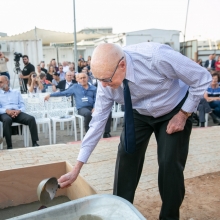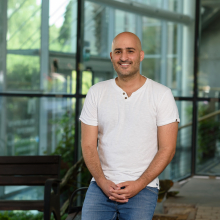Ellen Merlo
A commitment to science, women, and Weizmann
People behind the science

Based on the belief that women would welcome a common space to talk about philanthropy and learn about the Weizmann Institute of Science, the Chair of the American Committee, Ellen Merlo, established the Women for Science Program (W₄S) in 2014—and the initiative has taken off with great success in communities across the U.S.
While the program has resulted in significant funds raised for women scientists, its scope is wider, introducing participants to a range of Institute research and creating a cohesive community of women across America who are interested in a common mission. “We have created a forum where women can talk candidly about their approach to philanthropy and their goals, and exchange ideas,” she says. “It turns out that more and more women are gravitating to this conversation, which has led to whole new level of involvement and leadership for the American committee and for the Institute.”
The inaugural symposium for the W₄S program took place at New York University in November 2016, at which Weizmann Institute Vice President Prof. Michal Neeman spoke, together with Prof. Daniella Goldfarb, the President’s Advisor for Advancing Women in Science; Prof. Yadin Dudai of the Department of Neurobiology; and postdoctoral fellows Dr. Shiri Gur-Cohen and Dr. Anat Biran, both of whom received grants through the Israel National Program for Advancing Women in Science. Ms. Merlo led a lively panel discussion on women in philanthropy that included Weizmann friends Patricia Gruber, Marcy Syms, and Cheryl Black.
To date, the program has convened five virtual conferences with more than 100 women at eight to nine locations across the U.S. The participants were tuned in to videoconference talks by Weizmann Institute scientists speaking from Rehovot, including Prof. Idit Shachar, Prof. Yardena Samuels, Prof. Maya Schuldiner, Dr. Eran Elinav, and Prof. Shafi Goldwasser. Prof. Schuldiner also spoke about the challenges women scientists face in advancing their careers.
One key outgrowth of the program is the establishment of the Helen Kimmel Vision in Philanthropy Award, which recognizes special women in philanthropy.
Lessons from business, advancing philanthropy
In her lengthy career as a top executive in the New York business world, Ms. Merlo ensured that the women who worked for her had the flexibility they needed to manage a career and a family. “When I started my career 50 years ago, women weren’t welcome in the business world; we had to claw our way into management,” she says. “I worked hard and was lucky, and I used my position to bring other women along with me. I felt it was important not just for the sake of the women, but because having a workforce that is varied and integrated is better for business. Otherwise, half of all minds are lost.”
When she offered flexibility for the women who worked for her—allowing them to work at home or leave early for children’s doctor appointments—she found that “they actually are more efficient and more productive than many others in the workforce, because they are appreciative.”
Her relationship with the Weizmann Institute began in 2004, soon after retiring from the business world; as a breast cancer survivor, she began to think about finding a way to contribute to advancing science and medicine. An opportune meeting with Prof. Yair Reisner of the Department of Immunology was the moment she says she “got hooked” on the Weizmann Institute. A planned one-hour meeting turned into a two-and-a-half-hour discussion in which Prof. Reisner described his research on transplantation immunology and stem cells; his early studies had paved the way for the wide use of bone marrow transplantation in patients without a matched donor.
Soon after, she made a gift to stem cell research from the foundation she established in her mother's memory, the Pearl Welinsky Merlo Foundation, and has made multiple gifts to the Institute ever since. (She also gives widely to Jewish organizations and Israel-related causes.) But her contribution has also come in the form of very active leadership, becoming Chair of the American Committee and a member of the International Board and Executive Board of the Weizmann Institute—and especially pronounced in the creation and success of the W₄S program.
She also funds the Combined Postdoctoral Fellowship that is part of the Israel National Program for Advancing Women in Science. The Combined program supports women who split their postdocs between labs in Israel and abroad, giving outstanding women scientists the flexibility they need to spend less time abroad but still conduct postdoc studies in the best possible environments.
Of the Israel National Program, says Ms. Merlo, “I believe in this program and it resonates with me, and I see the excitement it generates in others. It is nourishing the careers of women scientists and, at the same time, is advancing Israeli science and academia—a wonderful achievement and I relish the idea that I have played a small part in it.”
When it comes to cultivating the careers of women in science more broadly, the same principles hold true as in her experience in the business. “We need to continue to level the playing field,” she says. “Women can succeed on their own brainpower and creativity, but given societal constraints and expectations, we just need to do what it takes to give them an opportunity to shine.”








